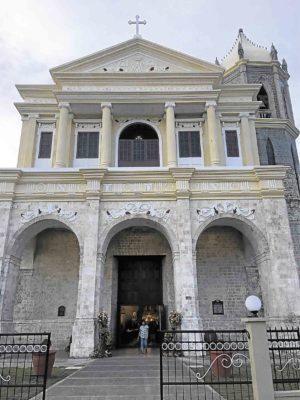
DAUIS, Bohol — For more than three years, parishioners of Our Lady of Assumption Shrine here were hearing Masses before a makeshift altar under the shade of a century-old acacia tree.
The 7.2-magnitude earthquake on Oct. 15, 2013, sent the church’s façade and a portion of its roof crumbling down. Its stone walls were cracked and dislodged.
On Aug. 14, the National Historical Commission of the Philippines (NHCP) turned over the fully restored Our Lady of Assumption Shrine to the Archdiocese of Tagbilaran — the perfect gift for the town on the eve of its fiesta.
The ceremony was followed by blessings and the first Mass inside the new church.
The NHCP spent P33.74 million to restore the Dauis church.
“The return of the church symbolizes the goodness of the people,” Celsa Aranas, 57, said in Cebuano. “They showed they were ready to help especially during calamities and those times when their faith was being tested.”
Aranas said that while it broke their hearts when they saw their church damaged by the quake, it also strengthened their faith.
The Our Lady of the Assumption parish church in Dauis town reopens almost four years after it was severely damaged by a 7.2-magnitude earthquake. —LEO UDTOHAN
Churchgoers triple
Since then, the number of parishioners attending Masses had tripled, Parish Vicar Rommel Anico said.
“Finally, when they see their church again, their faith was awakened after a long period of stupor,” Anico said.
Our Lady of Assumption Parish was established in 1697. The church, however, was built from 1863 to 1879 during the administration of Fr. Julio Saldaña.
Between 1919 and 1923, Fr. Natalio del Mar continued construction and commissioned renowned church painters, Rey Francia and Canuto Avila, to work on the interior.
Msgr. Juan Gorordo inaugurated the church in 1923.
The structure features Gothic influence and Greek columns, Baroque arts, neoclassical “retablos” and Renaissance ceiling painting.
The Dauis church crumbles from the impact of the 2013 earthquake. —LEO UDTOHAN
Miraculous water
A small well at the foot of the main altar is believed by devotees to be a source of miraculous water.
In 2009, the NHCP declared the Dauis church a national historical landmark, along with 16 other heritage churches that were damaged by the earthquake in the towns of Antequera, Baclayon, Bilar, Calape, Carmen, Corellas, Cortes, Danao, Dauis, Dimiao, Lila, Loay, Panglao, Sikatuna, Talibon and Trinidad towns and in Tagbilaran City.
The churches in Clarin, Inabanga, Loon, Maribojoc and Tubigon towns were destroyed.
Restoration work in Dauis was the first to be completed as architects and cultural workers were able to immediately find the right construction technique.
Reconstruction study
“The technology used before is not being used now since we already use steel and reinforced masonry,” said Benjamin Concepcion Empleo, a history researcher and architect in charge for the NHCP in Bohol.
The NHCP commissioned a team from the Association of Structural Engineers of the Philippines, led by seismic engineering specialist Carlos Villaraza, to undertake a study that would serve as the basis of a national structural code for traditional or unreinforced masonry.
The team conducted the study from 2013 to 2015, determining which restoration plans were unique to each church. Actual work lasted for another two years.
On Oct. 15, the NHCP turned over the Holy Trinity Church in Loay town. In December, it will turn over the country’s oldest church, the iconic Immaculate Conception Church in Baclayon and in May next year, the San San Isidro Labrador Church of Tubigon town.